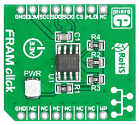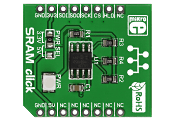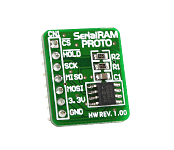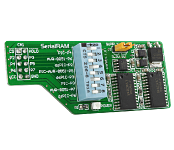|
|
| |
|
 | Search: |
|
|
|
|
|
 |

|
|
FRAM click brings 256Kbit (32,768 words x 8 bits) of Ferroelectric Random Access Memory to your design. It features the MB85RS256A module which uses the ferroelectric process and silicon gate CMOS technologies for forming the nonvolatile memory cells. It is able to retain data without using a back-up battery. The memory can be used for 10 bilion read/write operations and does not take long time to write data unlike Flash memories or EEPROM. It uses SPI to communicate with the target device. Maximum operating frequency is 25MHz. The board is designed to use 3.3V power supply only. |
|
|
|
|
 |

|
|
SRAM click lets you add 1Mbit of additional SRAM memory to your devices, via the 23LC1024 chip. It organizes the memory into 8-bit instruction registers and 32-byte pages. Three operating modes for reading and writing data are available: byte, page, and sequential (the last one allows read/write for the entire memory array). The clock rate for all three modes is up to 20MHz. The board communicates with the target MCU through the mikroBUS SPI interface (MISO, MOSI, SCK, CS) with additional HOLD functionality provided through the default mikroBUS RST pin. SRAM click is designed to use either a 3.3V or 5V power supply. |
|
|
|
 |

|
|
The SerialRAM PROTO Board enables you to add a 64Kbit Serial RAM device to your prototype device. A 23K640 Serial RAM device is available on-board and communicates with microcontrollers via a Serial Peripheral Interface (SPI). |
|
|
|
 |

|
|
The SerialRAM Board enables you to use a 64Kbit Serial SRAM device with your development board. The board features the 23K640 Serial RAM device that communicates with microcontrollers via a Serial Peripheral Interface (SPI). |
|
|
|
 |
|
|

